

PublicWelcome. The World Clock Meeting Planner - Results. Canvas Guides. Assessment/Evaluation Topics. Instructional Strategies for Online Courses Effective online instruction depends on learning experiences appropriately designed and facilitated by knowledgeable educators.

Because learners have different learning stylesor a combination of styles, online educators should design activities multiple modes of learning in order to provide significant experiences for each class participant. In designing online courses, use multiple instructional strategies. Teaching models exist which apply to traditional higher education learning environments, and when designing courses for the online environment, these strategies should be adapted to the new environment.
Traditionally, in a teacher-centered classroom, instructors control their environment because they have a monopoly on information. Online learning environments permit a range of interactive methodologies. Learning contracts connect educational needs to individual student needs. The discussion group Guided design Role playing Games The panel.
Universal Design for Learning (UDL) PhET: Free online physics, chemistry, biology, earth science and math simulations. Flickr, a Yahoo company. Commons. Like a Veil: Cross-cultural Experiential Learning Online – CITE Journal. The online discussions are like a veil that protects me and Yang; I feel safe enough to ask the hard questions I could never say to her face.
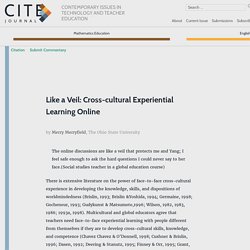
(Social studies teacher in a global education course) There is extensive literature on the power of face-to-face cross-cultural experience in developing the knowledge, skills, and dispositions of worldmindedness (Brislin, 1993; Brislin &Yoshida, 1994; Germaine, 1998; Gochenour, 1993; Gudykunst & Matsumoto,1996; Wilson, 1982, 1983, 1986; 1993a, 1998). Online discussions: tips for instructors. Facilitating Effective Group Discussions: Tips. Effective facilitation of a discussion involves the recognition and employment of different perspectives and different skills to create an inclusive environment.
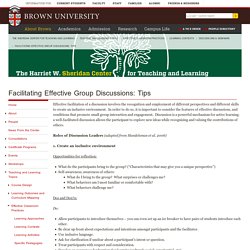
In order to do so, it is important to consider the features of effective discussions, and conditions that promote small group interaction and engagement. Discussion is a powerful mechanism for active learning; a well-facilitated discussion allows the participant to explore new ideas while recognizing and valuing the contributions of others. Roles of Discussion Leaders (adapted from Handelsman et al. 2006)
Canvas Instructor Guide. A new community is here!
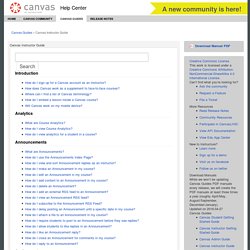
Canvas Guides Canvas Instructor Guide Download Manual PDF This work is licensed under a Creative Commons Attribution-NonCommercial-ShareAlike 4.0 International License. Can’t find what you’re looking for? More Resources New to Instructure? Download Manuals While we won’t be updating Canvas Guides PDF manuals every release, we will create the PDF manuals at least three times a year (roughly April/May, August/September, December/January).
Updated on 2016-04-27. Eight Roles of an Effective Online Teacher. June 3rd, 2013 By: Bernard Bull EdD Teaching face-to-face and teaching online are both teaching, but they are qualitatively different.
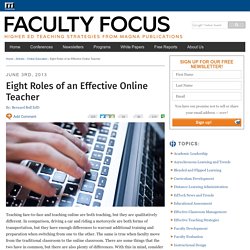
In comparison, driving a car and riding a motorcycle are both forms of transportation, but they have enough differences to warrant additional training and preparation when switching from one to the other. The same is true when faculty move from the traditional classroom to the online classroom. On Dangerous Myths. One could not hope for a better example of everything that is misguided about American educational thinking than this article from that grab-bag of trendy ephemera, the Huffington Post.
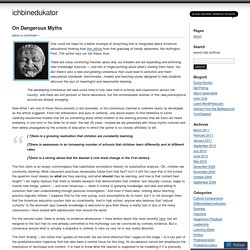
The author lays out her thesis thus: 2015 Guide: Approaches to Teaching and Learning (ATL) in the DP - OSC IB Blogs. Approaches to teaching and learning (ATL) in the Diploma Programme is designed to support key values and principles of an IB education and has been developed since 2011 to align the DP with the PYP and MYP.
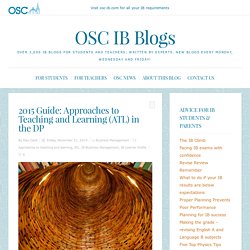
The new ATL guide and supporting materials are intended to improve the quality of teaching and learning across all four IB programmes. As we develop Business Management programmes, teaching plans and resources, we must look to incorporate fundamental IB philosophies, represented in the Learner Profile and ATL. In a practical sense, these are represented by the six concepts underpinning the new BM guide. January and February 2015 are timetabled for the publication for all ATL materials, which will be incorporated into all future DP professional development.
ATL documents should be in IB World Schools by September 2015. No Warm and Fuzzy Wishes – A Critical Interrogation of Assessment and Feedback. The problem with trying to turn a webinar presentation into a blog post is the same problem as trying to turn the tools of the f2f classroom into the models for the online classroom.

There is a category confusion that obscures fundamental differences, and leads inexorably to the kind of horror show that online education has become in some venues. So what you will read here is a hybrid creature, borne of the union between lecture and lightshow, between accessibility and accountability. It’s ugly, but not dangerous. Perhaps…. Effective Feedback Strategies for the Online Classroom. Editor’s Note: The following article is an excerpt from the whitepaper Efficient and Effective Feedback in the Online Classroom.
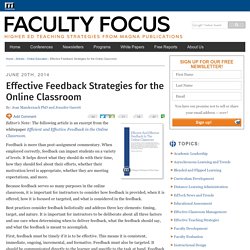
Feedback is more than post-assignment commentary. When employed correctly, feedback can impact students on a variety of levels. It helps direct what they should do with their time, how they should feel about their efforts, whether their motivation level is appropriate, whether they are meeting expectations, and more. The 7 questions every new teacher should be able to answer. Teaching for the 21st century looks a lot different.

Here’s what admins — and teachers — need to know for job interviews and beyond Not long ago, the leadership team of a school district I was working with asked me: “If you were going to hire a new teacher, what would you ask in the interview?” They were concerned that hiring teachers with the right skills now can save a district a lot of money in staff development later. Moreover, they wanted to hire teachers who would be open minded about changes to come. Ms. Computer Teacher - Hello. Every Teacher’s Guide to Assessment. It’s not a stretch to say that assessment is a hot button issue in education; however, you’d be hard pressed to find an educator who doesn’t see the value in measuring student progress. Assessments themselves have been vilified, when, in fact, it’s why assessments are given and how the data is used that is really the issue.
The Glossary of Education Reform gives this great overview of what high-stakes testing is and how it impacts students, teachers, and schools. Policy - 01 Assessment – Pamoja Education Help Centre. Ref/ACSST/OPS/POL/ASS/020315 Principles of Assessment The Pamoja Education assessment policy is founded upon the principle that assessment should aim to Promote student learningMeasure student attainment and engagementProvide constructive feedback and supporting evidence regarding student attainment and engagement. How to Motivate Students in the Online Learning Environment. How do I change my login password? Canvas recently introduced a new page design called the New Canvas User Interface (UI). This lesson may include two images for specific steps to show the difference between the two designs. Unless otherwise indicated, the functionality and location of the components remain the same. Home. How to Humanize Your Online Class - 2.